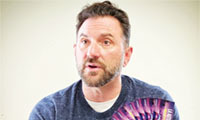After 58 continuous years of performances in London, the surprise ending of the Agatha Christie play “The Mousetrap” has been largely preserved by the estimated 10 million people who have seen the play.
Shows strive for
surprise; the Web
thrives on exposure
There is one notable exception: Wikipedia. The online encyclopedia , in a single sentence, reveals the killer. In an age of information overload, it is getting harder to preserve mystery and surprise in entertainment. Olympics results are reported via Twitter before they are shown on television, and TV show plots are revealed by people on the set or Web sites .
“It’s hard to argue that there is an intellectual or academic reason for getting deeply into the secrets of a movie that the vast majority of the public has not had access to,” said Andrew Jarecki, whose 2003 documentary, “Capturing the Friedmans,” also contained crucial plot twists. Wikipedia, however, considers itself a comprehensive reference work and thus doesn’t censor facts.
Movies, plays and books may be caught in the worst bind. “There is a distinct difference between spoiling something, and writing about something after it happens,” says Carlton Cuse, an executive producer of the “Lost” TV series. “ ‘The Mousetrap’ is a work that exists in both spaces.” Mr. Cuse said he had no problem with Wikipedia printing the plot of the much-anticipated finale to “Lost.” “Once it has officially aired, the narrative is out there for public consumption,” he said.
The musician and mystery writer Rupert Holmes was less forgiving of Wikipedia’s penchant for exposing his twists. “The rules of ‘full disclosure’ don’t apply to fictional creations,” he wrote in an e-mail. “ We want, even hope to be tricked, surprised, stunned.” An illusionist “is selling us the childlike thrill of believing, for one moment, that there really could be magic in the world.”
He also questioned the motives of someone eager to report the surprise in a creative work. “It’s the self-aggrandizing vandalism of another person’s potential pleasure,” he said. David Thomson, the film critic and author of “The New Biographical Dictionary of Film,” said he had learned not to give away the endings of the movies after hearing from readers.
Mr. Thomson, who was born in Britain but lives in San Francisco, said he was less concerned about “The Mousetrap.” “I was raised to believe that everyone in Britain had already seen ‘The Mousetrap,’ ” he said. “I saw it when I was a child, and I can’t remember the ending.”
스마터리빙
more [ 건강]
[ 건강]이제 혈관 건강도 챙기자!
[현대해운]우리 눈에 보이지 않기 때문에 혈관 건강을 챙기는 것은 결코 쉽지 않은데요. 여러분은 혈관 건강을 유지하기 위해 어떤 노력을 하시나요?
 [ 건강]
[ 건강]내 몸이 건강해지는 과일궁합
 [ 라이프]
[ 라이프]벌레야 물럿거라! 천연 해충제 만들기
 [ 건강]
[ 건강]혈압 낮추는데 좋은 식품
[현대해운]혈관 건강은 주로 노화가 진행되면서 지켜야 할 문제라고 인식되어 왔습니다. 최근 생활 패턴과 식생활의 변화로 혈관의 노화 진행이 빨라지고
사람·사람들
more
“최첨단 신차들… LA 오토쇼에서 경험하세요”
118년의 전통을 자랑하는 세계적인 자동차 축제 ‘LA 오토쇼’가 오는 21일부터 30일까지 LA 컨벤션센터에서 대대적으로 열린다. 전 세계 …

파바월드 펀드레이징 골프 토너먼트 성황
파바월드(대표 명원식)는 지난달 31일 캘리포니아 컨트리클럽에서 2025년 파바월드 펀드레이징 골프 토너먼트를 개최했다. 130여 명의 후원자…
KAMA USA 시니어모델협 8일 기금 마련 바자…
KAMA USA 시니어모델협회(회장 백은경)가 오는 8일(토) 오전 11시부터 오후 2시30분까지 LA 한인타운 윌셔와 후버 코너에 위치한 컬…
타운에 첫 한인 운영 수학·과학 정규학교
LA 한인타운에 수학·과학에 특화된 정규 사립중학교 ‘윈저 아카데미’(WMSA, 4055 Wilshire Blvd. #400, LA)가 지난 …
서각협회 ‘서각 교류전’ 11월1일 리앤리 갤러리
한국목우서각협회(회장 정기호)와 미주한인서각협회(회장 이애령)가 11월 1~8일 LA 한인타운 리앤리 갤러리에서 서각교류전을 갖는다.가주 의회…
많이 본 기사
- 국토안보부 “운전면허 기록 공유하라” 파문
- 셧다운발 항공 ‘대혼란’… LAX 등 운항 차질 심화
- ‘푸드스탬프’ 재개되지만 “11월 절반 액수만 지급”
- 엔젤레스 국유림 차량 전복 한인 사망
- 고물가 속 ‘대출의 덫’ 빠진 미국… ‘중산층 붕괴’
- 다저스 WS 우승 축하 퍼레이드… LA ‘들썩’
- ‘차광렬 줄기세포상’에 아이어스 교수
- ‘마약 카르텔’ 맞서다가 멕시코 시장… 1
- 오늘 가주 ‘특별선거’ 투표소 오후 … 2
- “이러니 한국 청년들이 결혼 안 하지”…日언론도 경악한 韓결혼 비용 얼마길래
- ‘클리넥스’ 킴벌리클라크, 타이레놀 품는다
- ‘유흥업소 출입 의혹’ 김준영, 소속사 쉴드 불가.. “모든 작품서 하차”
- 중, 한국인 무비자 조치 내년 말까지 1년 연장
- 비트코인 ‘업토버’ 7년 만에 끝났다
- 손흥민 ‘1골 1도움’ 맹활약… LAFC, 플레이오프 8강 진출
- 대도시 주민·고소득층… “성경은 사실 아냐” 인식
- 26년전 ‘아내 살인범’ 잡아 일본서… 고교 동창이 범인
- 김·미역을 해외서는 약국에서 판다고?
- ‘얄미운 사랑’ 이정재, 첫방 시청률 공약 지키나.. “수양대군 사인회”
- 조지아 이민단속 여파… 한국 기업들 투자 철회
- 삼성전자, 특허 소송서 연달아 패배
- 김하성, 1천600만달러 포기하고 FA 시장 나왔다…옵트 아웃 행사
- 우리가 감사하며 살아가야 할 생명체
- 첫 무슬림 뉴욕시장 나오나 ‘관심 집중’
- [조선갈비] “30주년 맞은 한식 명가… 변함없는 고객 성원 보답”
- GG 코리아타운 한인 시니어 ‘보금자리’
- ‘힌두교 아내 개종희망’ 발언 논란
- 트럼프 “엔비디아 최첨단칩 타국에 안… 1
- 또 총영사관 사칭 보이스피싱… 지속 발생
- [존청 변호사의 “경제·법률 핫이슈”] 내 집 한 채가 전부인데… 리빙 트러스트가 정말 필요한가?
- 트럼프 ‘핵실험 재개’ 지시 파문… 에너지부 장관 “핵폭발 없다”
- 셧다운에 美공항 마비 우려…교통장관 “全공역 닫아야 할수도”
- 보잉 7년 적자 끝 ‘턴어라운드’ 조짐 ...월가 “주가 최대 50% 상승도”…엔지니어 출신 CEO 기대
- AI 혁명의 명암, 샌앤젤레스가 던지는 경고
- 아이온큐·엔비디아 쓸어담았다…개미, 10월 해외 주식 9조원 ‘폭풍 순매수’
- 다저스 우승 퍼레이드, LA 한복판 충돌…경찰차 공격·폭발까지 아수라장
- 메타, 채권 발행 250억달러 조달
- 이이경, MBC ‘놀면 뭐하니?’에서 빠진다…”하차 의사 밝혀와”
- ‘깐깐해지는 시민권 심사’ 5년간 미국내 거주기록 철저히 본다
- ‘야구의 신’을 놓친 양키스, “야마모토도 NYY 좋아했다, 357억 더 썼어야” 후회해도 늦었다
- 아프간서 규모 6.3 강강진… 최소 20명 사망·500여명 부상
- 보장소득·건강·전문가상담이 핵심
- 직장 내 성희롱 방지법
- 국힘, ‘秋영장’에 시정연설 불참… “이젠 전쟁, 李정권 끌어내려야”
- 손흥민, MLS 플레이오프 8강전서 토마스 뮐러와 격돌
- “편도 수술, 해? 말어?” 고민 끝… 기준 정해드립니다
- [지평선] 러너들에게만 천국인 서울
- [화요칼럼] 캘리에서 온 가을
- 날개 단 ‘K-김’… 수출 10억달러 시대
- 오픈뱅크, 저소득층·노년층 지원 사업도 시작
1/5지식톡

-
 테슬라 자동차 시트커버 장착
0
테슬라 자동차 시트커버 장착
0테슬라 시트커버, 사놓고 아직 못 씌우셨죠?장착이 생각보다 쉽지 않습니다.20년 경력 전문가에게 맡기세요 — 깔끔하고 딱 맞게 장착해드립니다!장착비용:앞좌석: $40뒷좌석: $60앞·뒷좌석 …
-
 식당용 부탄가스
0
식당용 부탄가스
0식당용 부탄가스 홀세일 합니다 로스앤젤레스 다운타운 픽업 가능 안녕 하세요?강아지 & 고양이 모든 애완동물 / 반려동물 식품 & 모든 애완동물/반려동물 관련 제품들 전문적으로 홀세일/취급하는 회사 입니다 100% …
-
 ACSL 국제 컴퓨터 과학 대회, …
0
ACSL 국제 컴퓨터 과학 대회, …
0웹사이트 : www.eduspot.co.kr 카카오톡 상담하기 : https://pf.kakao.com/_BEQWxb블로그 : https://blog.naver.com/eduspotmain안녕하세요, 에듀스팟입니다…
-
 바디프렌드 안마의자 창고 리퍼브 세…
0
바디프렌드 안마의자 창고 리퍼브 세…
0거의 새제품급 리퍼브 안마의자 대방출 한다고 합니다!8월 23일(토)…24일(일) 단 이틀!특가 판매가Famille: $500 ~ $1,000Falcon: $1,500 ~ $2,500픽업 & 배송직접 픽업 가능LA…
-
 바디프렌드 안마의자 창고 리퍼브 세…
0
바디프렌드 안마의자 창고 리퍼브 세…
0거의 새제품급 리퍼브 안마의자 대방출 한다고 합니다!8월 23일(토)…24일(일) 단 이틀!특가 판매가Famille: $500 ~ $1,000Falcon: $1,500 ~ $2,500픽업 & 배송직접 픽업 가능LA…
케이타운 1번가
오피니언
 문태기 OC지국장
문태기 OC지국장 GG 코리아타운 한인 시니어 ‘보금자리’
 민경훈 논설위원
민경훈 논설위원우리가 감사하며 살아가야 할 생명체
 박홍용 경제부 차장
박홍용 경제부 차장 AI 혁명의 명암, 샌앤젤레스가 던지는 경고
 정유환 수필가
정유환 수필가 [화요칼럼] 캘리에서 온 가을
 이영태 / 한국일보 논설위원
이영태 / 한국일보 논설위원 [지평선] 러너들에게만 천국인 서울
 이육사
이육사 ‘서풍’
 옥세철 논설위원
옥세철 논설위원인구 고령화, 그 예기치 않은 선물은…

남아선호는 옛말(?)
 캐슬린 파커 워싱턴포스트 칼럼니스트
캐슬린 파커 워싱턴포스트 칼럼니스트 [캐슬린 파커 칼럼] ‘트럼프 연회장’은 도금된 창고
1/3지사별 뉴스

본선거 하루 앞…“투표합시다”
11월4일 본선거가 하루 앞으로 다가온 가운데 뉴욕일원 주요 한인단체들이 2일 한인상점들이 몰려 있는 퀸즈 노던블라바드 156가 머레이힐 샤핑…
뉴욕·뉴저지 한인 유권자 10만명 육박

총기 규제, 마리화나 흡연엔…
거의 매일 총기사고가 발생하고 있지만 미국에서 총기는 쉽게 손댈 수 없는 ‘뜨거운 감자’다. 연방법은 약물 사용자에 대한 총기 소유를 규제하고…
“꼭 투표하세요”민주당 정치인들, 투표독려

美 “中, 조선·해운 보복조치 철회키로”…한화오션 제재 풀리나
도널드 트럼프 대통령과 시진핑 중국 국가주석이 타결한 무역 합의의 일환으로 중국이 한화오션의 미국 자회사에 부과한 제재를 철회할 가능성이 제기…
“총영사관 등 사칭 보이스피싱 주의 하세요”

오늘 하루 이 창 열지 않음 닫기 



















































.png)


댓글 안에 당신의 성숙함도 담아 주세요.
'오늘의 한마디'는 기사에 대하여 자신의 생각을 말하고 남의 생각을 들으며 서로 다양한 의견을 나누는 공간입니다. 그러나 간혹 불건전한 내용을 올리시는 분들이 계셔서 건전한 인터넷문화 정착을 위해 아래와 같은 운영원칙을 적용합니다.
자체 모니터링을 통해 아래에 해당하는 내용이 포함된 댓글이 발견되면 예고없이 삭제 조치를 하겠습니다.
불건전한 댓글을 올리거나, 이름에 비속어 및 상대방의 불쾌감을 주는 단어를 사용, 유명인 또는 특정 일반인을 사칭하는 경우 이용에 대한 차단 제재를 받을 수 있습니다. 차단될 경우, 일주일간 댓글을 달수 없게 됩니다.
명예훼손, 개인정보 유출, 욕설 등 법률에 위반되는 댓글은 관계 법령에 의거 민형사상 처벌을 받을 수 있으니 이용에 주의를 부탁드립니다.
Close
x